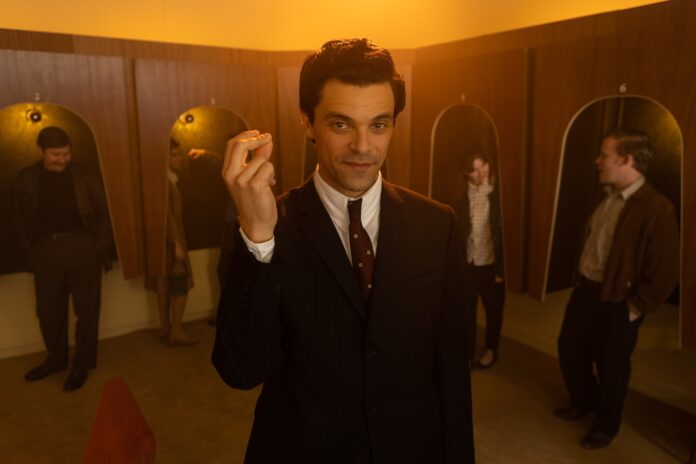On Nov. 9, 1961, the Beatles were “discovered” by Brian Epstein, a gay man, in a Liverpool club called The Cavern. “The moment my life changes forever,” Epstein (Jacob Fortune-Lloyd) says at the opening of “Midas Man,” a new biopic about him, adding, “And everything suddenly becomes so clear.”
But this film, directed by Joe Stephenson, and available Jan. 22 via Olyn, is more vague than clear. “Inspired by real events,” it recounts Epstein’s professional and personal life during a time that was exciting for music and dangerous for gay men.
None of the Beatles’ music is used in the “Midas Man,” (likely a rights issue) but this is not really a drawback because the film is a character study of Epstein, not the band. A workaholic who saw immense potential in the Beatles, Epstein devoted his life to making them “bigger than Elvis” — much to the headshaking of naysayers, and the handwringing of his father, Harry (Eddie Marsan). Even so, scenes of Epstein ironically striving to convince record labels to sign the Beatles feel trite, however accurate.
Although Epstein has never managed a band before, he gets Allan Williams (Eddie Izzard) to turn the brash musicians over to him, and Epstein coaches the Beatles on how to appear and perform. After replacing Pete Best (Adam Lawrence) with Ringo Starr (Campbell Wallace), Epstein helps them record songs, go on tour in London and America, and become global stars.
The plot is modest, and so too is this medium-to-low budget film. Stephenson often stages scenes in ways that suggest the events rather than show them. This works well with the band’s tours, which are cleverly presented with Epstein narrating (in direct address) the experiences to the camera as walls of images behind him reflect scenes from the cities and events he describes.
Epstein’s personal life is also addressed with restraint. It is often awkward when the topic of his sexuality is discretely raised with his mother, Queenie (Emily Watson), and a chat Epstein has with a supportive client, Cilla Black (Darci Shaw) — she encourages him to find someone to love — is lovely and heartfelt.
“Midas Man” is more revealing about its subject when it shows Epstein’s life as a gay man. “Terrible things can happen when you are forced by laws to live in the shadows,” Epstein narrates, saying that his private life “never charts” while his band has “one hit after another.” When out cruising, Epstein is robbed and later extorted, and his father worries that it will bring shame on the family.
In America, Epstein meets “Tex” Ellington (Ed Speleers), an actor, whom he kisses in a bar and then spends the night with. When Tex arrives unexpectedly in London, the smitten Epstein pays Tex a stipend and promises to help him career-wise to keep him around. The idea that Tex is using Epstein for his money and connections is not unfounded.
The pressures of the Beatles’ fame and having a secret gay relationship take their toll on Epstein who eventually has a breakdown. Epstein’s mental health, his striving to achieve (and earn his father’s admiration), as well as his patchy self-worth as a gay man are all featured in the film, but they somehow feel undercooked. “Midas Man” raises these points without digging deeply into any of them. This makes the film feel superficial, and shortchanges viewers interested in wanting to know more about its subject, never mind the Beatles.
As Epstein, Jacob Fortune-Lloyd is charming even when he breaks the fourth wall (a clunky device) or conveys his excitement as his career reaches dizzying heights. A cute out-of-character moment has the buttoned-up Epstein screaming like a teenage girl. Likewise, when Epstein experiences crises, Fortune-Lloyd makes his anxiety feel palpable. Epstein is very vulnerable and watching him mask his insecurities with a suave bravado is why the film is so likeable. The actor also cuts a dashing figure in the stylish period costumes.
The supporting performances are also stronger than the material. Emily Watson provides layers of emotion to her underwritten character just with a few well-placed looks toward her husband or at Tex when either man says something she questions. And while Ed Speleers also deserves more fleshing out as a character, he exudes charisma that holds viewers’ attention as he does Epstein’s.
As for John Lennon, Paul McCartney, George Harrison and Ringo Starr, actors Jonah Lees, Blake Richardson, Leo Harvey-Elledge and Campbell Wallace, respectively, bear enough of a resemblance to the Beatles to pass. (Blake Richardson’s Paul being the standout in that regard.) The Fab Four make Epstein a bit crazy, but there seems to be a strong sense of love and respect. However, the film glosses over what the Beatles think of Epstein. His sexuality is never discussed with the band, which is a missed opportunity perhaps. (In contrast, Christopher Munch’s excellent 1991 film, “The Hours and the Times,” depicts what might have happened between Epstein and John Lennon during a trip to Spain in 1963.)
Although “Midas Man” shows how Epstein’s double life impacted him, Stephenson’s film would have been stronger if it had focused solely on Epstein’s personal or his professional life. By telling both stories, it does not quite do justice to either one. Nevertheless, this is a watchable, enjoyable portrait of a man whom Paul McCartney once dubbed, “the fifth Beatle.”

